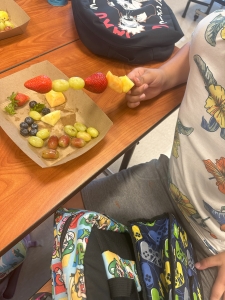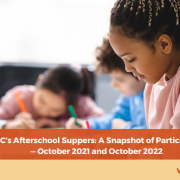The Food Research & Action Center’s (FRAC) latest report shows that afterschool meal programs are struggling to meet the needs of children as pandemic era waivers have ended and as costs have skyrocketed. FRAC, the nation’s leading anti-hunger organization, has found that participation in afterschool meal programming has dropped substantially for the first time since 2010.
The Afterschool Nutrition Programs provide nutritious meals and snacks to children as well as educational and enrichment programming after the school day ends. The Afterschool Snack Programs began in 1998, and suppers became available nationwide in 2010 through the Healthy Hunger-Free Kids Act.
FRAC’s report, “Afterschool Suppers: A Snapshot of Participation,” analyzes the noticeable changes in afterschool meal participation, particularly comparing October 2021 and October 2022. The report found that over 1.15 million children received afterschool suppers through the Afterschool Nutrition Programs on an average school day in October 2022, reaching approximately 339,360 fewer children compared to October 2021.
Conversely, participation in afterschool meal programming was relatively stable during the pandemic, increasing 2 percent in 2020 and 3 percent in 2021, when the USDA issued waivers for all schools to participate and addressed operational challenges.
The pandemic-era waivers were critical in eliminating the barrier to participate in the afterschool meal programming and eased the burden of operating it. As a result, it allowed schools, local government agencies, and nonprofit organizations to effectively operate the Afterschool Nutrition Programs during the pandemic.
Only 38,034 sites served afterschool suppers or snacks in 2022, a significant drop of 5,089 sites from 2021 since pandemic-era waivers have ended. In 2022, sites could only operate in high-poverty communities, limiting access to suppers and snacks for millions of children who need them.
Now, with a return to pre-pandemic operations, many afterschool programs and meal sponsors are struggling with staffing shortages, increased food prices, and operational challenges. As a result, many programs have been closed, forced to limit capacity, or not been able to recover at all.
The drop in participation highlights the urgent need to reverse the concerning downward trend that started with the end of the pandemic waivers and support. FRAC’s report has highlighted the critical need to grow the Afterschool Meal Programs and recover lost ground to better serve the children and families who rely on afterschool suppers. Efforts to increase funding and expand meal programming for afterschool meals needs to be a priority to create a solid foundation to meet the needs of children, youth, and families.
Expanding Access to Afterschool Meals
In their report, FRAC noted that more than 1.6 million children missed the opportunity for a nutritious meal as a result of states failing to use federal funding. In particular, four states (Florida, Georgia, New York, and Texas) missed out on more than $6 million each. When states fail to take advantage of these funds, children and families lose nutritious meals that keep hunger at bay.
According to the Afterschool Alliance, there are 24.7 million children who are not in an afterschool program but would be enrolled if a program were available to them. Afterschool programs are an important platform not only to ensure children fed but also safe and engaged when the school day ends.
FRAC recommends the following way for Congress, states, and localities to support Afterschool Nutrition Programs:
- Streamline and simplify Afterschool Meal Programs by eliminating duplicative, burdensome paperwork
- Increase funding for afterschool programming
- Lower the area eligibility threshold to reach more children
- Support and expand year-round participation
- Mandate state participation and allocate funding
- Recruit more school districts
- Serve suppers instead of (or in addition) to snacks
- Improve meal quality and appeal
- Reduce travel or time barriers
Advocate to Strengthen and Protect Afterschool Meal Programs!
Take action and be a voice against hunger! Afterschool Nutrition Programs are a powerful platform to fight childhood hunger and food insecurity in Florida. Support the children who need nutritious afterschool snacks and suppers to keep hunger at bay. Alleviating hunger in children should remain our highest priority and championed at every level! Get vocal and speak to your elected representatives!
Find Your Elected Officials Here
Download FRAC’s full report here or visit frac.org for more information.
 This program teaches elementary school students how to eat healthy and live well. During this session, we focused on healthy snacking and taught students how to make Rainbow Fruit Kabobs.
This program teaches elementary school students how to eat healthy and live well. During this session, we focused on healthy snacking and taught students how to make Rainbow Fruit Kabobs.





